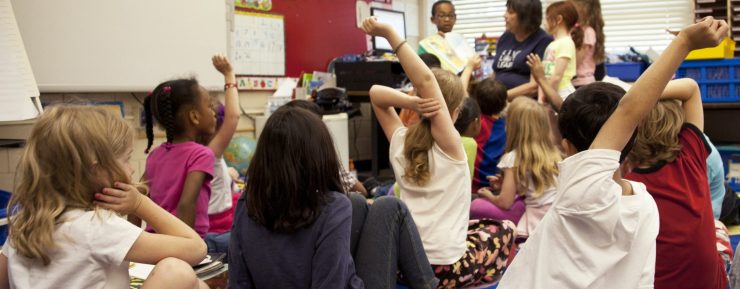Behind the Facebook smiles of our children and teachers

We’re used to seeing the beautiful faces of our young children across our schools in Cornwall. Joyful, trusting and, we hope, nurtured and cared for. But what has it really been like for them during this pandemic?
Katie Fitzsimmons, Director of Education for the Diocese of Truro, spoke very movingly at a recent synod, giving a behind-the-Facebook-smiles insight into the lives of our young children, families and teachers.
Katie approached all the schools across the diocese to see if there was anything they wanted to share. There was so much that was positive and encouraging, truly showing the light in the darkness. In the midst of something very frightening and confusing, teachers, children, parents and carers were responding brilliantly, reaching out, going way more than that extra mile to create safe, creative learning spaces at home and in schools.
Children living out Christian values in the most extreme circumstances
“Saying we encourage our schools to be built on Christian values in one thing, but actually seeing them live that out in the most extreme of circumstances has been breath-taking. How the belief that service is at the core of what we do, how children see themselves as part of that and how that has rippled out into the community has been awesome.” Katie talked about children at St Mary’s Truro who wrote to people in the local care home because they couldn’t have visitors. “It’s so enriching for everyone. The school takes that and says yes, we value that. They include learning objectives and, brilliant, you’ve used a fronted adverbial, but actually you’ve done that in the spirit of doing a good thing to help others.”
“Saying we encourage our schools to be built on Christian values in one thing, but actually seeing them live that out in the most extreme of circumstances has been breath-taking,” Katie Fitzsimmons, Director of Education for the Diocese of Truro.
Schools at the epicentre of activity during lockdown
What perhaps a lot of people don’t realise during the first lockdown is that, despite the headlines, schools didn’t close. They didn’t even close at half term or during the Easter holidays. They continued to provide lessons, support and even food far in advance of any support or guidance for how to do it. Schools were an epicentre of activity as staff created and delivered resource packs; developed online learning environments and recorded messages and even sourced, packed and delivered food parcels.
Despite the storm, staff were positive and encouraging throughout, searching for solutions to the raft of problems they faced daily, including the financial ones. These included the costs of providing meals, the necessary additional cleaning and PPE and the problem of staff shielding and covering staff absences. As Katie says, “School communities are used to carrying the burden of decision making, particularly as it relates to the life chances of children, but they were less prepared to manage around fatal infection risks.”
Says one head teacher, “Stepping back and reflecting about the pandemic hardly featured. Everything needed to happen so fast…We were so busy making sure we had risk assessments and procedures in place, enough food and staff, providing the right sort of education for children in school and online, maintaining children’s and staff’s wellbeing and communicating clearly to parents.”
Teachers understood that for too many children, lockdown meant being locked-in
On top of all of this was the constant concern that each day away from school impacts on children’s development and, for some, increases the risks of abuse and suffering. For too many children, lockdown meant being locked-in. We all know that homelife for some children is not as it should be, and that it’s all too easy to push these truths away. They are hard to look at. Teachers don’t have that choice.
The best place for vulnerable children is at school where, as well as maintaining learning, they have safe spaces to play, share, eat and talk. But that wasn’t always possible. Instead, teachers across Cornwall made sure children were regularly contacted at home, whether online or on the doorstep. As Katie says, “The impact of this cannot be underestimated. Door-step hellos with a food parcel brought huge smiles and excited conversation as “Miss” had come around.” One to one online contact with ‘Miss’ also bridged a gap and helped maintain important connections, as well as providing opportunities to make sure everything was ok.
The impact of (home visits) cannot be underestimated. Door-step hellos with a food parcel brought huge smiles and excited conversation as “Miss” had come around.”
Heartbreaking stories of children suffering were played out all across Cornwall
One child who wasn’t ok was suffering increased violence and strict controls over food, water and contact at home. The family wasn’t previously on anyone’s radar, but the concerns were picked up by a teacher in an online session and escalated through the safeguarding procedures to ensure help was given.
Another child’s parent had come out of rehabilitation at the beginning of the year, but during lock-down, without face-to-face support, relapsed in their battle with alcoholism. The child attended school but sometimes had to stay home to make sure the parent was safe.
One child was living with a clinically vulnerable grandparent in a one bedroom flat because it wasn’t safe to be at home. As time progressed social care started to search for foster placement. At the end of one reflection time this child said, ‘I am just thankful that even in COVID, people are still willing to foster children.’
The stories are heart-breaking and are sadly played out right across Cornwall. Our schools have done outstanding work and continue to do so, despite the present circumstances. Many are coping with anxiety fatigue, the perpetual state of worry felt by themselves, their families and the children they care for. Winter is upon us, we are in a second lockdown and it’s becoming less easy to see the positives that the first wave brought.
Teachers are weary, it’s winter, a second lockdown but still they keep the lights shining
As Bishop Hugh said in a recent letter to the diocese, “We are facing a tough winter, and many people are already running low on reserves – their energy, their money, their resilience. Many people are tired of all the challenge and change, but this situation isn’t going away any time soon, so we need to stay committed to caring and looking out for one another – and especially for those who are suffering most.”
Doing the unusual in the usual way
Yet still there is hope and Katie Fitzsimmons, Director of Education, is determined to keep that light glowing across our schools. “The power, the ray of light from it all, is how we live out our words, our vision. Not just saying our values, or writing them down on mission statements, banners and websites, but living them out. We are not just coping but thriving in challenging times. As Liz Robinson, co-director of Big Education says, ‘we are doing the unusual in the usual way.’ For me, if we live out our words and allow them to permeate everything we do, that enables us to keep going even when it’s the unusual. Living out our values means we cherish and encourage each other, helping us all to cope with the challenges as they come.”
The power, the ray of light from it all, is how we live out our words, our vision. Not just saying our values, or writing them down on mission statements, banners and websites, but living them out. We are not just coping but thriving in challenging times.




